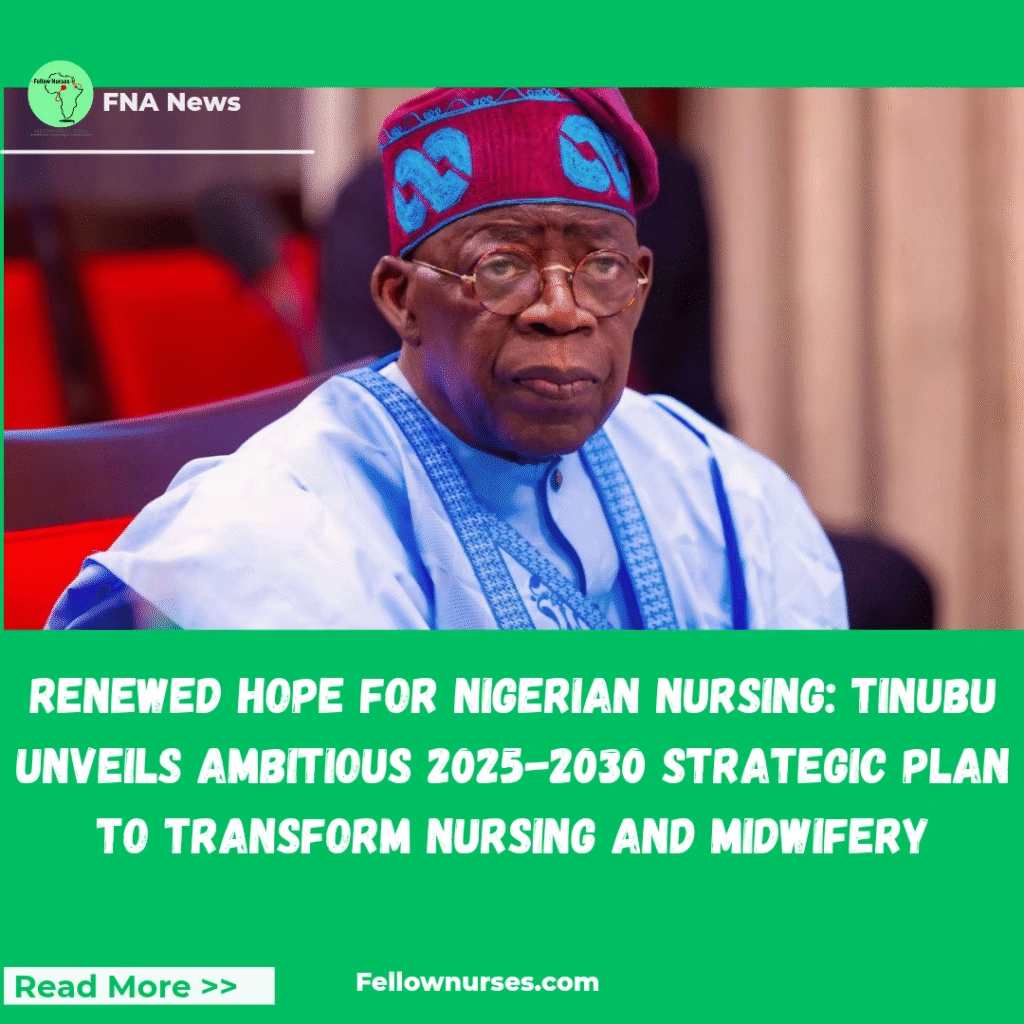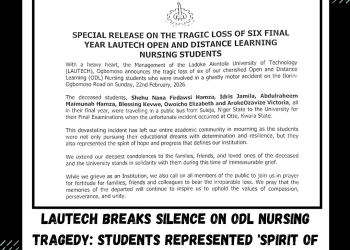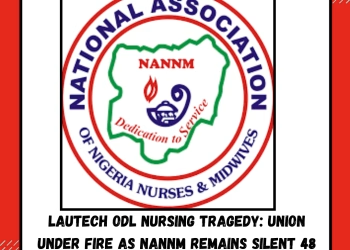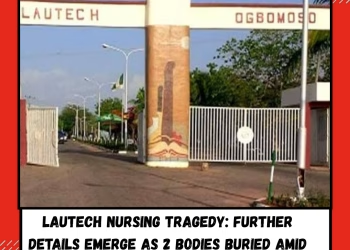
RENEWED HOPE FOR NIGERIAN NURSING: Tinubu Unveils Ambitious 2025-2030 Strategic Plan to Transform Nursing and Midwifery
Abuja, Nigeria – October 9, 2025 – In a landmark event signaling a new era for Nigeria’s healthcare system, the Federal Ministry of Health and Social Welfare (FMOH&SW), under the leadership of President Bola Ahmed Tinubu’s administration, unveiled the Nigeria Strategic Directions for Nursing and Midwifery (NSDNM) 2025-2030.
This transformative five-year blueprint, developed in collaboration with the World Health Organization (WHO) and the United Nations Population Fund (UNFPA), aims to revolutionize nursing and midwifery through advanced education, leadership, job creation, and enhanced service delivery, aligning with the Nigeria Health Sector Renewal Investment Initiative (NHSRII) to achieve Universal Health Coverage (UHC) and Sustainable Development Goals (SDGs).
The high-profile launch, moderated by Mrs. Salome Ekeremor, was attended by distinguished dignitaries, including the chief of staff to the President, Hon Femi Gbajabiamila,Coordinating Minister of Health and Social Welfare Prof. Muhammed Ali Pate, CON, the representative of the Minister of State for Health, Chief Nursing Officer of Nigeria DNS Okafor, Dr. Mrs. Kemi Ogunyemi (Special Adviser to the Lagos State Governor on Health), DNS Lagos State Ministry of Health Nurse Olusola Aketi, former Nursing and Midwifery Council of Nigeria (NMCN) Registrar Dr. Farouq.
Also in attendance is the Registrar, nursing and midwifery council of Nigeria Alh. Alhassan Ndagi, NANNM officials and other key stakeholders. The ceremony underscored the critical role of nurses and midwives as the backbone of Nigeria’s healthcare delivery.
A Vision for Healthcare Transformation
The NSDNM positions nurses and midwives as “highly competent professionals” delivering evidence-based, world-class care to meet Nigeria’s evolving health needs. Anchored on four strategic pillars—Education, Job Creation, Leadership, and Service Delivery—the 54-page strategy addresses critical workforce gaps while fostering inclusivity and innovation. Dr. Onbanigo, FMOH nursing representative and former Deputy Governor of Rivers State, highlighted the framework’s alignment with WHO’s global efforts to tackle nursing shortages and advance UHC, describing it as a “pivotal moment for Nigeria’s health ecosystem.”
Stakeholders praised the NSDNM as a transformative step, emphasizing that nurses and midwives are the “core of healthcare delivery” and the first point of contact for communities.
The UNFPA representative stressed Nigeria’s need for an additional 70,000 nurses and midwives by 2030, pledging robust support to the FMOH. Dr. Farouq, former NMCN Registrar, commended Prof. Pate’s leadership, noting that this marks the “first time” the FMOH has given such focused attention to nurses, a sentiment echoed by Dr. Onbanigo, who praised the minister and the “digital registrar and his digital members” for their inclusive approach.
Elevating Nursing Education to Global Standards
Building on Nigeria’s nursing education legacy, from the University of Ibadan’s post-basic programs in 1965 to the current 33 universities offering Bachelor of Nursing Science (BNSc) degrees, the NSDNM outlines ambitious educational reforms. Prof. Pate announced a significant increase in nursing institution enrollment quotas from 28,000 to 100,000, reflecting the Tinubu administration’s commitment to scaling the workforce. Key priorities include:
- Competency-Based Curricula: Standardizing programs to equip nurses for advanced roles like Advanced Nurse Practitioner (ANP) and Clinical Nurse Specialist (CNS), addressing challenges such as non-communicable diseases and emergency care.
- Infrastructure and Faculty Upgrades: Enhancing over 400 nursing schools and colleges by addressing faculty shortages and equipment deficits, with NMCN-led accreditation to ensure quality.
- Lifelong Learning: Promoting continuous professional development (CPD) to foster specialization and improve the nurse-to-population ratio from 1:1063.
These initiatives aim to produce a highly skilled nursing workforce capable of leading interdisciplinary teams and advancing research-driven practice.
Empowering Transformational Leadership
The NSDNM envisions nurses and midwives as transformative leaders shaping Nigeria’s health policy and practice. Strategic leadership priorities include:
- Senior Governance Roles: Expanding nurse representation in ministries and agencies to influence health policy and improve retention.
- Early-Career Development: Investing in mentorship and leadership training through public-private partnerships to build advocacy and management skills.
- Clinical Leadership: Developing clinical guidelines and standard operating procedures to enhance service quality, with nurses leading interdisciplinary teams.
Dr. Dike Obalomu, representing Chief of Staff to the President Dr. Femi Gbajabiamila, emphasized that the NSDNM aligns with President Tinubu’s vision for inclusive, people-centered care. “Nurses are the sole heartbeat of healthcare,” he stated, adding that supporting and repositioning nurses is “non-negotiable.” He urged nurses to embrace collaboration, noting that the strategy seeks to expand access, promote opportunities, strengthen institutions, and improve nurses’ welfare.
Job Creation and Service Delivery Excellence
The NSDNM supports the NHSRII’s goal of operationalizing over 17,000 functional Primary Healthcare Centres, creating job opportunities to address nurse migration and workforce shortages. Collaborative efforts with state ministries and civil society will ensure demand for trained professionals. In service delivery, the strategy prioritizes supportive workplaces to enhance patient safety, mental health services, and integrated care.
Prof. Pate praised the exemplary service of Lagos State nurses, citing a personal experience where a relative received rapid, high-quality care, and acknowledged Dr. Mrs. Kemi Ogunyemi’s contributions as a nurse and special adviser. Mrs. Ekeremor highlighted that the NSDNM empowers nurses to contribute to policy-making, marking a new era of influence.
A Unified Call to Action
The unveiling, led by Prof. Pate alongside key stakeholders, symbolized a collective commitment to the NSDNM’s success. The FMOH&SW expressed gratitude to consultants Prof. Chika G. Ugochukwu and Prof. Saleh N. Garba, as well as partners like UNFPA, USAID, and JPHIEGO, for their contributions. The ministry called on state governments, private sectors, and development agencies to collaborate in implementing this transformative strategy, which promises to elevate healthcare delivery across Nigeria.
Download the NSDNM 2025-2030
Explore the full Nigeria Strategic Directions for Nursing and Midwifery (NSDNM) 2025-2030 document at Fellownurses.com.
Fellow Nurses Africa is the independent voice of African nursing, we educate, inform and support nurses across Africa
**Download the full document here 👇










